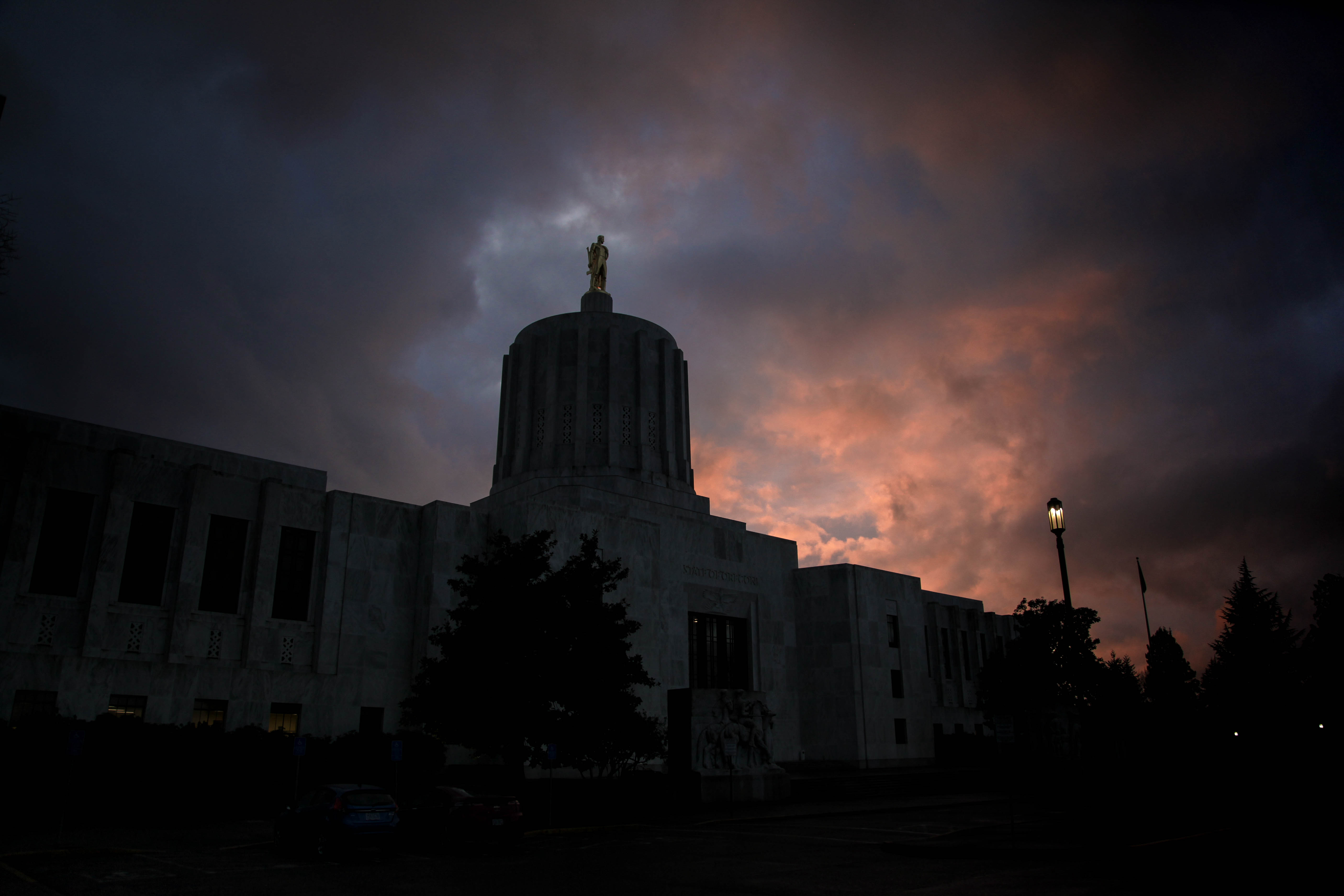Oregon lawmakers put a bow on an unprecedented five-month legislative session Saturday, passing major bills on clean energy, wildfire prevention and police reform before adjourning their chambers for a final time.
After breaking early Friday to some legislators’ dismay, the Legislature spent Saturday hustling more than 50 bills in quick succession. In a session that had sometimes been marked by rancor, lawmakers closed out in collegial and lighthearted fashion -- some of them notably dressed down for the affair in shorts and novelty t-shirts.
Carrying on a Capitol tradition, legislators in the House and Senate opened their chamber doors shortly after 5:30 pm, waving at each other across a Capitol rotunda that has remained eerily empty for more than a year as a final resolution adjourning the session “sine die” passed in the House.

The interior ceiling of the Oregon Capitol.
Chris Lehman / KLCC
The flurry of bills passed on Friday and Saturday, characteristic of late-session chaos, capped five months that were remarkable not only for the policies enacted, but the manner in which they were passed.
A session that House Speaker Tina Kotek, D-Portland, said early on would be “about crisis response and helping people” certainly retained some of that character, with lawmakers extending policies to protect renters from eviction and homeowners from foreclosure, while pouring money into relief for victims of 2020′s historic wildfires.
Related: Oregon legislative coverage by OPB reporter Dirk VanderHart
But legislators did far more, too. A package of police reforms that passed with bipartisan support did not go as far as some advocates would have liked, but still included serious changes to the way law enforcement officers can respond to protests and how they face discipline.
Related: 1st police oversight bills clear Oregon Senate, head to Gov. Kate Brown for signature
Meanwhile, Democrats needed the buffer granted by their supermajorities to pass sweeping environmental bills that set some of the nation’s most ambitious goals for cleaning up the power grid and ensuring producers have a stake in whether their products are recycled.
And lawmakers passed a record state budget, marshalling shockingly strong revenue projections and billions in federal aid to outline a $29.4 billion spending plan that sent money to every corner of the state, increased school spending and made historic investments into housing and mental health.
All that, by the way, occurred in an unprecedented virtual session where partisan tensions and high-profile incidents of lawmaker misconduct threatened to distract from policy and budget work — and led to Oregon’s first-ever expulsion of a lawmaker, former state Rep. Mike Nearman.
“I feel like the focus that we had on COVID, wildfire recovery, racial justice — that was there for three months,” said state Rep. Brian Clem, D-Salem, one of the longest tenured members of the House. “As society opened up, so did did the political spectrum.”
Though tensions flared at times, lawmakers avoided the serious breakdowns of 2019 and 2020, when Republicans effectively shut down the Legislature to block a climate change bill. Democrats were inclined to describe the session as a big success, while Republicans complained throughout that the majority party was pushing bills through without enough vetting and without enough input by the general public.
“From the start, we called for a focus on pandemic recovery, returning students to school and assistance to wildfire impacted communities,” House Republican Leader Christine Drazan, R-Canby, said in a statement after adjournment. “As the legislative session progressed, it was clear transparency suffered as public policy was rushed through behind closed doors.”
“Unfortunately, Democrats advanced an extreme agenda that will continue to artificially depress Oregon’s potential,” Senate Minority Leader Fred Girod, R-Lyons, said in a statement that nonetheless applauded the session’s budget investments and public safety reforms. “Many critical issues were left ignored by the supermajority, like reforming the Governor’s emergency powers.”
Kotek, meanwhile, suggested that lawmakers had found a way to come together after a bruising 2020 session.
“We left in February and it was hard, we were very broken,” she said Saturday, referencing last year’s session. “Then the pandemic hit, and none of us stopped working... I feel like we’ve done everything we can in this moment with the capacity we have to serve communities that needed us.”
Senate President Peter Courtney, D-Salem, concurred.
“You can’t say this session was broken,” he told reporters. “In fact, it was remarkable.”
A focus on police reform and equity
Following more than 100 days of protests in response to the murder of George Floyd last summer, lawmakers like Rep. Janelle Bynum, D-Happy Valley, and other members of the BIPOC caucus were vocal coming into the session about their commitment to advancing reforms around policing and accountability. The work followed up on six new laws passed last June aimed at changing the way police do their jobs.
Out of more than a dozen bills considered this session, one of the biggest efforts to come out of that policing package was HB 2929, requiring officers to report misconduct or intervene to stop it.

A file photo of a Bend police responding to a protest on Oct. 3, 2020. Oregon legislators passed a range of legislation aimed at reforming policing in the state this year.
Emily Cureton Cook
Another bill, HB 2513, now requires officers to be trained in airway and circulatory anatomy and to be certified in cardiopulmonary resuscitation. Still another will set up a statewide background check process that flags racist behavior and requires agencies to report evidence they find in their search of a candidate’s history and social media presence.
Other bills look at how police handle protests like those that played out for months in Portland last year. One modified a state law defining unlawful assemblies. Another altered the offense of interfering with a peace officer, which critics have argued was used to improperly arrest protesters. The change allows officers to use the statute only when someone actively interferes with their ability to do their job.
Work around police accountability did not taper off in the later days of the session. Just this week lawmakers approved bills to curb law enforcement’s use of pepper spray, projectiles and sound cannons in dispersing crowds. They also directed Oregon police agencies to participate in nationwide data collection on the use of force and solidified the authority of citizen oversight boards to review cases of misconduct and participate in arbitration proceedings.
In the same vein, social equity and racial justice also took center stage this session. Juneteenth, celebrated to commemorate the day in 1865 that slaves in Texas learned they were free, is now an official state holiday. And the Legislature passed resolutions urging Congress to take a look at reparations and changing language in the 13th Amendment that allows slavery as punishment for a crime.
People convicted of bias crimes on state recreation land can now be barred from re-entry to state parks and waters for up to five years, an attempt to preserve safety and access for BIPOC Oregonians seeking to enjoy the state’s natural beauty and recreation opportunities.
The CROWN Act, a bill banning discrimination based on hairstyles, also represented a win for BIPOC lawmakers.
Related: Oregon legislative coverage by OPB reporter Sam Stites
Stemming a worsening crisis
Housing and homelessness also got considerable attention this session. Bills extending the eviction and mortgage foreclosure moratoriums enacted early on in the pandemic and again last fall were crucial safety nets that kept thousands of Oregonians from losing their homes as the pandemic dragged on.
A fix to prevent a mass eviction event in July also came at the eleventh hour, providing a 60-day pause for those who could prove they’ve applied for rental assistance. That same fix also ensured landlords can receive 100% of rent they’ve had to forego during the pandemic.

A file photo of camping on a Portland sidewalk. Housing and homelessness were at the heart of a number of bills passed in Oregon's 2021 Legislative session.
Amelia Templeton / OPB
In wrestling with the state’s growing homelessness crisis, lawmakers concentrated on a pair of bills that curb camping regulations: one will require local jurisdictions to give longer notice before clearing encampments; the other attempts to stifle anti-camping policies by requiring them to be reasonable in regards to people experiencing homelessness.
Lawmakers also passed bills aiming to make it easier for those who lost their homes in the 2020 wildfires to rebuild and authorized counties to adopt policies that forgive property taxes for those same folks.
A more restrained approach to environment
After a contentious cap-and-trade proposal twice led to Republican walkouts, Democrats brought a less ambitious environmental agenda to Salem this year. Even so, advocates say they accomplished a lot with two bills the majority party pushed through on the session’s final days.
With House Bill 2021, the Legislature set some of the nation’s most ambitious targets for switching to 100% clean energy. Under the legislation, the state’s two largest power companies will have to eliminate their carbon emissions by 2040, with interim goals along the way. Just as important, advocates say, are provisions that grant impacted communities a say in how power companies switch to green sources of energy, and set strong labor standards for new renewable energy projects.
Lawmakers also grappled with the state’s troubled recycling system, which has seen more recyclable materials sent to landfills because items are deemed “contaminated.” Under Senate Bill 582, the state will require producers of packaging to help pay the cost of recycling, assist in achieving higher recycling rates, and help local governments improve their processes, among other things.
Bracing for fire season
Perhaps the most omnipresent issue of the past couple of years in Oregon is wildfire, a topic lawmakers decided to hold off on until the end of session. Whether that was for strategic reasons — Democrats wanting to motivate Republicans to stick around — or to give the topic as much consideration as possible, is unclear.
This year’s big omnibus bill, Senate Bill 762, sent nearly $200 million to state agencies in order to mitigate wildfire’s impact on Oregon’s landscape, adapt communities to smoke, map out fire risk, establish rules on defensible space around rural properties, and fund forest restoration projects. The bill seeks to define what areas of the state should be considered part of the wildland-urban Interface (WUI) and categorize land based on wildfire risk. It also requires electric companies to start drafting plans for how they’ll adapt infrastructure and shut off policies to wildfire conditions, and directs the state’s Public Utility Commission to oversee that process.

Sam Drevo walks through wildfire damage in September, 2020 in the town of Gates, Oregon, where he owned a home and river guide business. Last year's devastating fires made wildfire response a critical topic in the 2021 legislative session.
Tyler Westfall
Much of the negotiations on the bill took place in private, so when Republicans announced heavy opposition as the bill came up in the legislature’s joint budget committee the last week of the session, that resistance was somewhat a surprise to many who felt the state couldn’t ignore long-range wildfire planning for a second year in a row.
But lawmakers were able to cut a deal securing bipartisan support for the bill which will delegate responsibility to define the WUI to the Oregon Department of Forestry.
The bill passed with strong support in both chambers.
A revealing fight on guns
Despite their ongoing dominance in Salem, Democrats had been stymied for years in their attempts to pass new gun controls. That changed in 2021.
In one of the session’s most contentious and illustrative fights, Democrats pushed through Senate Bill 554. The bill sets new requirements for how gun owners must securely store their weapons when not in use, a policy gun control advocates had pushed for years. It also banned guns in the Capitol and Portland International Airport, and paved the way for public schools and universities to pass their own gun bans.
SB 554 was universally disliked by Republicans, but it left the party in a bind. After years of walking away from Salem to block climate legislation, GOP members had created expectations they would walk to disfavored bills. That meant that, rather than applying pressure on Democrats, gun rights supporters began putting heat on Republicans.
“Some unscrupulous organizations have misled Oregonians into thinking that lobbying any Democrat is a waste of their time — that instead they should push the easy button, to call on me to deny quorum,” House Minority Leader Rep. Christine Drazan, R-Canby, said when her chamber took up SB 554. “They were told that instead of voting no, I have an obligation to leave right now before the final gavel drops.”
House Republicans did not bow to that pressure, but nearly half of Senate Republicans walked away from the Capitol, rather than showing up to vote on SB 554. While the six Republican senators who did attend votes on the bill all strenuously opposed it, that has not been enough to avoid blowback: Two of those senators now face recall campaigns because their presence allowed Democrats to pass the bill.
Delay tactics lead to redistricting deal
While 2021 did not see the extended Republican walkouts that marred the prior two sessions, it was hardly peaceable. The session began with tumult — and never really let up
Lawmakers, still shaken by a Dec. 21 incursion into the Capitol, delayed the start of session by two days amid security concerns. No similar breaches of safety would occur in the next five months, but a central flashpoint of that December incident — the closure of the Capitol to the general public — was an ongoing issue of the session.
As lawmakers met in virtual committee hearings and convened in person on the House and Senate floors, Republicans demonstrated their ongoing disagreement with protest votes and repeated calls on Democrats to buck Gov. Kate Brown’s COVID-restrictions.
The most consequential such effort by the minority party was House Republicans’ insistence for more than a month that bills be read in full before a final vote in the chamber. From March 9 until April 14, every bill — no matter how benign or bipartisan — was read out loud, line by line, slowing the session’s progress to a crawl.
The tactic led House leaders to read bills with computer software for the first time in state history. And while it did not force Democrats to rethink the closed Capitol, the standoff did result in what might be one of the more consequential twists of the session.
In exchange for Republicans’ giving up their right to force bill readings, Kotek offered them full parity on a committee responsible for drawing new political districts in the state that will last for the next 10 years. In doing so, the House speaker got a green light to pursue her party’s short-term legislative goals, but she gave up a stranglehold on the redistricting process that Democrats had secured in the 2020 election.
The decision, critics say, could especially impact Oregon’s congressional delegation, since Republicans will have far more say in how the state’s newly-acquired congressional district will be drawn.
“That was like shooting yourself in the head,” U.S. Rep. Kurt Schrader, a Democrat, recently told POLITICO.
Kotek said Saturday that the critics had it wrong.
“My top priority was to make sure we could have a successful session. WE did,” she said. “I also believe we’re going to have a transparent and accountable process for redistricting. I think it will be fine at the end of the day.”
Consequences for lawmaker behavior
Two years after updating its rules governing conduct by lawmakers and others in the Capitol, the Legislature got plenty of chances to put the process into action in 2021.
Over the course of the session, three male lawmakers in the House faced accusations of harassment and other problematic behavior — with two of them ultimately forced out of the body.
In a series of wrenching hearings that began shortly after the session convened, House lawmakers took up harassment complaints by numerous women against then-state Rep. Diego Hernandez, D-Portland. The allegations largely concerned women with whom Hernandez had had consensual romantic relationships that ended badly, and who also worked or did business in the Capitol.
Lawmakers found Hernandez had violated legislative harassment policies and were preparing to expel him when he resigned before that could happen.
In April, allegations emerged against state Rep. Brad Witt, D-Clatskanie, after a female Republican lawmaker in the House accused him of sending harassing texts. In a series of hearings, a bipartisan panel of lawmakers found that, while Witt likely did not mean for the texts to be inappropriate, they came off that way.
The committee ordered Witt to undergo training, but deadlocked on more serious consequences. Kotek, the House speaker, enacted some of her own.

Rep. Mike Nearman, R-Polk County, chats with fellow representatives on the House floor on April 11, 2019, at the Capitol in Salem, Ore. He faces criminal charges after allowing far-right demonstrators to breach the state Capitol in December 2020, and has been expelled from the Legislature.
Kaylee Domzalski / OPB
But the most dominant conduct issue of the session involved Nearman, a four-term representative from Polk County who was captured on tape allowing far-right demonstrators into the Capitol as lawmakers met on Dec. 21. Based on that footage, Democrats and liberal groups had called on Nearman to resign for months. But with members of his party keeping quiet on the issue, he refused, content to play a marginalized role.
Nearman’s fate took a severe turn, however, when more footage emerged showing him planning the Capitol breach with supporters. Members of his party immediately turned on him and, when he refused to resign, he was expelled on June 10.
He has shown interest in trying to recapture his seat by being appointed to serve as his own replacement.
An unprecedented budget
Never the most thrilling aspect of a legislative session, the two-year budget lawmakers crafted this year was remarkable. What had once figured to be a painful exercise in cutting costs turned into a spending bonanza, thanks to $2.6 billion in federal help from the American Rescue Plan Act and eye-popping revenues that defied all expectations.
“I’ve done budgets for years,” Kotek said Saturday. “The complexity of this one has been mind-boggling.”
Between general fund money, lottery revenues and federal aid, lawmakers worked out a plan for spending some $29.4 billion. That’s a far cry from the $23.6 billion in general and lottery funds approved for the current budget, and led to some interesting arrangements.
Flush with aid money, Kotek and Senate President Peter Courtney hatched a novel plan to give each lawmaker personal control over how millions of dollars would be spent. Those allotments — $4 million for senators, $2 million for House members — allowed legislators to handpick favored projects or causes to support, with little limitation.
The budget also included more than $300 million to help bolster the state’s troubled mental health system, more than $500 million for water infrastructure, and more than $600 million on helping people recover from the 2020 wildfires, and to prevent future fires. Lawmakers spent more than $760 million on housing initiatives, including money for affordable housing and assistance for landlords and renters. And they approved $100 million to expand the state’s Medicaid program for undocumented adults.

Oregon House speaker Tina Kotek, May 18, 2021.
Kristyna Wentz-Graff / OPB
“Truly an amazing sight,” said state Rep. Paul Holvey, D-Eugene, offering highlights of the budget to his colleagues on the House floor.
In the most contentious piece of the state budget, lawmakers approved a $9.3 billion budget for K-12 schools. That was a record sum, and well more than legislative budget staff said would be required to fund the schools at a status quo level, but came under fire from Republicans and schools officials, who argued $9.6 billion was necessary.
Things left undone
Lawmakers were not successful in getting all of their priorities for 2021 across the finish line.
Democrats entered the session hoping to fundamentally reshape the state’s framework of mandatory sentences for violent crimes, approved repeatedly by voters. But opposition by district attorneys and a requirement that the changes achieve two-thirds support in each chamber wound up tanking the effort — even after concessions by supporters.
Another bill that would have limited the ability of police to arrest people for some crimes also failed to garner enough support, despite backing by an array of community groups and Kotek, who called its failure “far and away my biggest disappointment of this session.”
“When you have a community driven process sometimes it just takes longer to make sure you get the bill right,” Kotek told reporters on Monday. “Frankly the Legislature has a lot to learn from a process like that.”
One stark area of inaction: Lawmakers failed to pass any new laws impacting the state’s campaign finance system, despite being explicitly granted authority to place limits on political contributions in the 2020 election. Proposed frameworks for limiting contributions failed to win enough support, in a building famously touchy about changes to campaign dynamics.
At the same time, a proposal to create a system for financing campaigns using public money was left for dead at the end of session. Lawmakers did enact one significant elections-related change, passing a bill that will allow ballots to be counted if they’re mailed — rather than received — by Election Day.
“If we weren’t in the middle of a pandemic, dealing with wildfire recovery and a couple other crises to boot, I think we would have gotten campaign finance done,” Kotek said. “That’s a big lift from a political standpoint and just to make sure you get it right, and honestly there were just too many other large things going on.”
Other proposals that failed to get a vote: A bill that would have allowed Oregon prisoners to vote (which could not muster support despite the pleas of John Legend), a proposal to tighten the state’s vaccine requirements, and several bills that would have created new consequences if lawmakers flee the Capitol to block a bill.
The biggest unfinished job of the session is one lawmakers have no choice but to complete.
Because of delays from the U.S. Census Bureau, the Legislature was forced to delay redrawing new legislative and congressional districts. They’re now expected to meet in a September special session, where that politically charged subject is likely to be the sole focus.
As Courtney put it Saturday: “The session did not end. Redistricting is a monster.”


